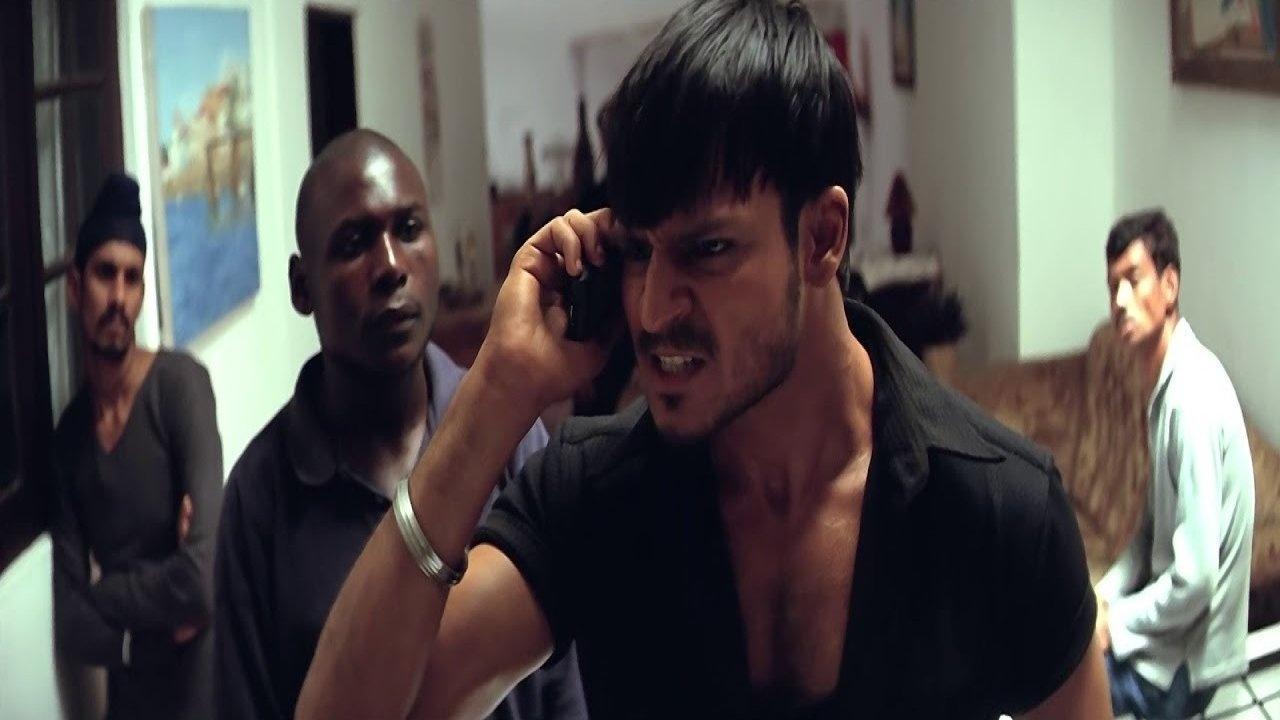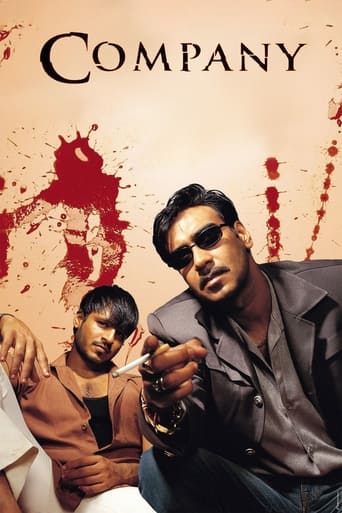

Terrible acting, screenplay and direction.
... View MoreAbsolutely the worst movie.
... View MoreInstead, you get a movie that's enjoyable enough, but leaves you feeling like it could have been much, much more.
... View MoreIt isn't all that great, actually. Really cheesy and very predicable of how certain scenes are gonna turn play out. However, I guess that's the charm of it all, because I would consider this one of my guilty pleasures.
... View More"COMPANY " make me fan of AJAY DEVGAN.He was supper in the movie ......................His way of dialogues delivery was so good . He speak very less in move but his way of speaking was super n acting was brilliant "COMPANY" is a good movie but it fall to my expectation after interval . Before interval it was really good but after interval it become little slow and boring ..............DIALOGUES were supper in the movie specially every AJAY'S dialogue like ------" THERE IS A ANIMAL INSIDE EVERYONE "......." I NEVER ASK FOR PERMISSION " well i will give only 6 \10 for this movie because it loose it strength after interval .................
... View MoreA depiction of Bombay/Mumbai's underworld scenario seen through the eyes of the Crime-Lord Ajay Devgan and new to the 'Company' Vikek Oberoi. The film is a loose take on the life of Dawood Ibrahim and his troupe.The film has excellent direction and a good script unlike most bollywood trash. The actors, who despite having little acting talent, have actually done a fabulous job in portraying their respective characters. Anatara Mali and Manisha Koirala have also done a good job supporting rest of the cast.A refreshing change from the usual bollywood stuff. A must see.Compare to: Satya, Godfather Thank you
... View MoreRam Gopal Varma pulled off a very beautiful film, full with suspense and action, what every avid film fan secretly desires.Complete with actual facts and thrill it was a fun movie and could probably be compare to Godfather being the marvel that it was. Based ON the Bombay underworld the actors had done justice to the roles given to them. My favorite was Ajay Devgan because of his realistic was of portraying the characters and he was basically the life of the film in my view...I can't help but repeat myself but It was that much of a splendid movieOf you want to go for a fun filled ride watch it..
... View MoreLike any great tragedy, this series of human catastrophes hinges on an objective contradiction, the one Max Weber identified with patrimonial bureaucracy. The origins of impersonal rule lie in the king's use of palace organization to assert his independence from the feudal barons who control the bulk of the people in the countryside. He needs a staff and recruits them as individuals who owe allegiance solely to him. But there is always the problem of distance, since local officials are pulled towards asserting their own independence of him. Beyond that he can't afford to let any of his henchmen get too big in case they go for him. Relatively stable forms of patrimonial bureaucracy depend on working out institutional rules for checking this tendency, such as moving officials around so that they can't develop local attachments or hiving off part of the job as a way of undermining a potential rival. It is this structural contradiction that launches a series of cumulative disasters whose instruments are the personal actors.The best dramatic example of Weber's principle in action is Eisenstein's Ivan the Terrible part 1. But Company is a pretty good instance too, as are most of Shakespear's history plays and tragedies. Etymological note: company means people who eat (bread) together, referring to how commensality is intrinsic to the solidarity of a group of soldiers. Note also that 'don' means both a mafioso and an academic, suggesting by analogy that intellectuals are killers which of course they are, since detachment requires them to dehumanize themselves and others.So the crux of the tragedy is that Mallik, having plucked Chandu from nowhere (C says "no-one can make it to the top the right way"), becomes too dependent on him and decides to limit his power by giving some of it to Krishnan. This leads to his killing Chandu's friend who can't stand the resulting friction. Then Chandu thinks the politician he eventually kills, Raote, is "not a proper guy" (a remark that one of the weaker soldiers thinks is funny, since it reveals that C believes there is honour among thieves). This partly leads him to baulk at killing the children of the minister. He calls off the contract unilaterally. "If the company can do without me, I can do without the company." And that is that, as far as Mallik is concerned, indeed as far as the logic of patrimonial bureaucracy is concerned. Towards the end of the movie, someone says, in response to the blame being put on Mallik for what everyone eventually realises was a mistake, "whatever's happening is the fault of the business, not one man". But of course, the business can only operate with one big boss or it fragments into impotence (petty feudalism), as in this case. This is why Shakespeare's cumulative exploration of the personal and impersonal contradictions of one man rule ends with the madness and civil war of King Lear.Morality is always personal and the war of criminal enterprise is impersonal. (One of the theme tunes at key moments is Mars from Holst's the Planets). Chandu embodies the contradiction more than the rest. He is a classic individualist of American westerns and gangster comic strips (Dick Tracy), the loner who doesn't believe in justice unless he does it himself. He legitimates his path because official society is just as corrupt but less honest and in any case the game is stitched up to exclude him. The state can produce a clever and basically decent policeman like Sreenivasan, but he knows that the police can't be effective if they always stay within the law. (S is a great successor to the detective Porphyry who undoes Raskolnikov in Crime and Punishment. Indeed he retires to be head of a police training college and is said to be writing a novel based on his experiences with the underworld, called Company...).Mallik is a political realist ("Friendship lasts as long as it lasts") who understands what he takes to be human universals better than most people who prefer not to recognize them. Saroja, his girlfriend, says "You're really a Satan" and he says "There's a Satan in everyone." Previously, "Sometimes I think there's a monster hidden in you". "There's a monster in every human being. It's just that some people are scared of confronting it." The struggle between individual morality and political realism embodied in Chandu and Mallik leads to the crisis. After its terrible denouement, Chandu hands himself over to the state and tries to make it up with Mallik. "I am about to do what I think is right. if you suffer any losses, don't take it personally." Shades of "Don't take this personal; it's just business" in The Godfather. The hit-man's dilemma is between morality and politics. The law just doesn't measure up, but it is all we have if we are not to be subject to rule by the mob."The Company stands on one thing. That's fear." It was built with "three weapons -- murder, money and compromise". One recurrent jingle says "Yes, it stinks, but it's business." Throughout the movie face-to-face encounters are mediated by conversations at distance using cell phones. If the railway locomotive was the symbol of 19th century industrial capitalism, the symbol of virtual capitalism in our day is the mobile phone. The Company goes international largely through use of this new technology: "The telephone became the biggest weapon in the underworld." A dazzling scene consists of a rapid montage of city landscapes with a soundtrack of phones ringing. This is indeed Shakespeare with mobile phones.A final point. As in King Lear, we should not forget the women. They play a central role in the unfolding of the tragedy as the contradiction between one man rule and the personal morality of his chief henchman descends into bloody civil war and mutual destruction.
... View More